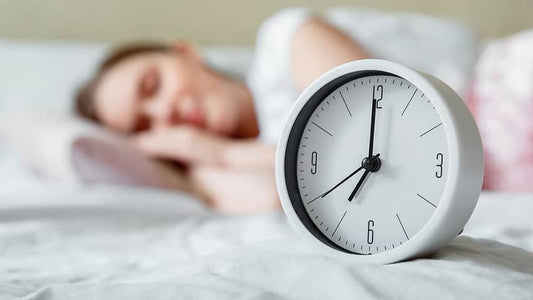For most people, breaking out the supplement organizer in the morning is the norm.
Whether it’s straight out of bed, with breakfast, or before your morning workout, the vast majority of supplements are designed to be taken first thing and do their job throughout the day.
Things like the B vitamins and a multi are best for morning or daytime, but other supplements are better taken at night to promote restful sleep and improved recovery.
If you’re a bit confused about when the best time to take your vitamins is, we’re here to help—we’re talking all things vitamins and sleep to help you get the most out of your supplements.
Why Take Vitamins At Night?
There are loads of vitamins available on shelves that promote energy. They boost mitochondrial function, help you metabolize your food to facilitate fuel availability, stimulate your nervous system to keep you awake and alert, and loads of other functions.
And while single vitamins and blends are all fantastic to get your morning started, taking them at night—or even mid-day—probably won’t do you much good. If it’s something like a B complex that energizes your body, even the most potent sleep supplements may not be enough to counteract it.
With that said, most of the vitamins and minerals designed for consumption in the evening or before bed have a couple of goals in mind that aren’t beneficial for daytime consumption: they help sleep or help the body repair and recover.
Whether it’s calming down the nervous system or boosting sleep hormones and neurotransmitters, certain supplements are most effective when taken at night, and we’re going to talk about the best ones next.
The Best 4 Vitamins For a Good Night’s Sleep
Magnesium
Magnesium is probably one of the most well-known supplements to support full-body relaxation, but it has also gained some traction as an awesome sleep-aid; this could be partly because of its role in over 600 biochemical reactions that support proper brain, muscle, heart function, and more 1.
Of these functions, there are a few that play a key role in sleep and are the main reason magnesium is a great supplement to take at night 2-5:
- Activates the parasympathetic nervous system to induce calmness and relaxation (your PNS is your ‘rest-and-digest’ system while your sympathetic branch is your ‘fight-or-flight’ and stress reaction)
- Plays a role in regulating levels of melatonin, the hormone that controls your sleep-wake cycle (circadian rhythm)
- Binds to gamma-aminobutyric acid (GABA) receptors; GABA is the main neurotransmitter involved in reducing nervous system activity and calming the body and is a component of many sleep drugs like Ambien
If that’s not enough, there’s ample research to support magnesium’s role in sleep, and insufficient amounts are linked to sleep disruptions and even insomnia 6. So, if it’s a sound sleep you’re after, take magnesium in the evening!
If you want to maximize the effects of magnesium on sleep, try Performance Lab Sleep®. It’s a potent combination of four natural nutrients designed to relax muscles, settle nerves, accelerate sleep onset, and maximize full-body regeneration.
With natural low-dose melatonin derived from Montmorency cherry and other joint- and muscle-soothing antioxidants, Sleep® promotes a deeper and more restful sleep than any other supplement on the market.
Tryptophan
We know tryptophan isn’t technically a vitamin OR mineral, but it’s a great addition to your nighttime supplement routine.
Most people will tell you that eating mass amounts of turkey makes you tired because of tryptophan, and while it does, in that case, it’s not the turkey doing it—it’s actually your body trying to process what you just ate.
But when you take tryptophan alone, the reason it makes you sleepy is because of how it’s metabolized:
Tryptophan ➔ 5-hydroxytryptophan (5-HTP) ➔ serotonin ➔ melatonin
Most tryptophan-containing supplements that also have other amino acids in them aren’t effective for sleep because of the competition to get into the brain.
Related Post: L-tryptophan vs. 5-HTP: Which is Better?
Tryptophan (a smaller amino acid) and larger amino acids use the same transport proteins to cross the blood-brain barrier, so generally, competition is too high to hitch a ride, and it doesn’t make it, thus cannot be converted to melatonin.
However, when you have something like Performance Lab Sleep®, where there is no competition, it’s much more likely to be effective.
Studies show that tryptophan taken about 45 minutes before bedtime improves the time taken to fall asleep in people with mild insomnia and people with a long sleep latency 7. And the best part is no next-day effects like synthetic melatonin.
Omega-3s
We’re likely all familiar with omega-3s or fish oil supplements. You’ll find loads of research to support the role of omega-3 fatty acids in muscle recovery, heart health, brain health, and more, but when it comes to sleep, can omega-3s help?
Turns out that something like Performance Lab Omega-3—a highly potent, super clean algae-derived omega-3—might just be the perfect addition to your bedtime routine. It’s high potency DHA+EPA to support peak performance in every body system.
Studies show that low levels of DHA are linked to lower melatonin levels, which is essential for helping you fall asleep.
In both children and adults, supplementing with omega-3s can increase length and quality of sleep 8. Low levels of omega-3s have also been linked to sleep apnea in adults 9.
Vitamin B6
While generally part of a B-complex, vitamin B6 on its own at night can actually help improve sleep. That’s because of its role in supporting serotonin and melatonin production, both of which are essential for a peaceful sleep.
Studies show that supplementation with B6 can increase plasma levels of melatonin by boosting melatonin biosynthesis and eliciting positive therapeutic effects on sleep 10. When combined with magnesium, it could help reduce sleep disturbances and improve sleep quality.
Avoid Taking These At Night
- Vitamin D—Known as the sunshine vitamin, vitamin D is a non-negotiable part of anyone’s diet, regardless of age. It keeps your immune system functioning, it regulates mood, builds strong bones, and the list goes on. But when it comes to the ideal time to take vitamin D, opt for morning or early afternoon. There’s some evidence suggesting that taking it at night can impede melatonin synthesis, which is bad news for your sleep.
- B vitamins—These guys are your energy-producing vitamins, and there is no way you’ll want to take them before bed unless you plan on pulling an all-nighter (which we don’t recommend either). They’re the crew that helps to support mitochondria (your energy powerhouses), turn food into fuel, and more. Taken during the day, they can contribute to better energy and more restful sleep, especially for people with insomnia, but taken before bed can translate into a sleepless night.
- Multivitamin—A multi seems like something you could take at any point of the day because it contains the nutrients you need for peak daytime performance and sound sleep, but because of those energizing principles, it’s also something you’ll want to avoid at night if you’re looking to get quality rest.
Final Thoughts
Knowing when to take your vitamins can be just as challenging as knowing which ones to take. Take with food, take on an empty stomach, take before bed, take upon rising—there’s all sorts of confusion.
But if you’re looking for a night of sound sleep and to maximize growth and repair, knowing the proper supplements and when to take them is vital.
Magnesium, tryptophan, omega-3s, and vitamin B6 are all awesome additions to your nightly routine to help relax the body and lull you into the best sleep of your life.
References
- JH de Baaij, JG Hoenderop, RJ Bindels. Magnesium in man: implications for health and disease.Physiol Rev. 2015;95(1):1-46.
- E Wienecke, C Nolden. Langzeit-HRV-Analyse zeigt Stressreduktion durch Magnesiumzufuhr . MMW Fortschr Med. 2016;158(Suppl 6):12-16.
- J Durlach, N Pagès, P Bac, M Bara, A Guiet-Bara. Biorhythms and possible central regulation of magnesium status, phototherapy, darkness therapy and chronopathological forms of magnesium depletion.Magnes Res. 2002;15(1-2):49-66.
- E Benzodiazepine/GABA(A) receptors are involved in magnesium-induced anxiolytic-like behavior in mice. Pharmacol Rep. 2008;60(4):483-489.
- DS Uygun, Z Ye, AY Zecharia, et al. Bottom-Up versus Top-Down Induction of Sleep by Zolpidem Acting on Histaminergic and Neocortex Neurons.J Neurosci. 2016;36(44):11171-11184.
- D Chollet, P Franken, Y Raffin, et al. Magnesium involvement in sleep: genetic and nutritional models.Behav Genet. 2001;31(5):413-425.
- SN Young. Is tryptophan a natural hypnotic?J Psychiatry Neurosci. 2003;28(2):160.
- K Peuhkuri, N Sihvola, R Korpela. Dietary factors and fluctuating levels of melatonin.Food Nutr Res. 2012;56:10.3402/fnr.v56i0.17252.
- P Montgomery, JR Burton, RP Sewell, TF Spreckelsen, AJ Richardson. Fatty acids and sleep in UK children: subjective and pilot objective sleep results from the DOLAB study--a randomized controlled trial.J Sleep Res. 2014;23(4):364-388.
- G Djokic, P Vojvodić, D Korcok, et al. The Effects of Magnesium - Melatonin - Vit B Complex Supplementation in Treatment of Insomnia.Open Access Maced J Med Sci. 2019;7(18):3101-3105.















